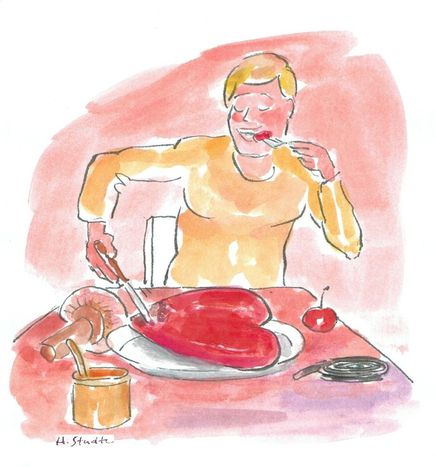
A-Z glossary of European terms of endearment
Published on
Translation by:
Marta N.From the coasts of Portugal via the Balkans to the Urals, locals become cannibals, zoophiles, astronomers and gastronomists when they give their lovers pet names. Here are some tips on nicknames to use when trying to hit on that cute foreign boy or girl, whether you are serious about hooking up abroad or just having a good-natured laugh
A. Amore (Love)
In Italy that is how lovers usually refer to one another. It’s cute and goes to show that the country is not all about bunga bunga
B. Bébé d'amour (Love baby)
What? ‘A baby made of love’? The French seem to be talking nonsense, but after all that’s what love is (also) about
C. Cariño (Affection)
If you go to Spain remember to say that to the Lola of the moment if you don’t want to get ‘calabazas’ (turned down)
D. Dropje (Liquorice)
They produce it, consume it and love it. Dutch people go as far as calling their women as their favorite candy. Nationalism or tradition?
E. Erazanqneris Taguhi (Queen of my dreams)
If you’re off to discover Armenia (and its girls), you need to put a little extra effort in. Try it! Erazank…Erazanq…
F. Fıstığım (My pistachio)
Arabs brought pistachios (a product of Persia) to Europe. Nowadays Turks use it as part of their love vocabulary
G. Gomba (Mushroom)
Boletus or champignon, it makes little difference. Hungarian girls like to be called ‘mushroom’. Just keep away from the poisonous ones
H. Honey
For all the gluttonous ones. If your heart is skipping a beat in the UK, it’s time for a spoonful of love. Winnie the Pooh would turn green with envy
I. Ihana (Delicious)
You can’t go to Finland without knowing this word. It’s a real jack-of-all-trades. It will always mean something positive, ranging from ‘beautiful’ and ‘good’, to ‘marvellous’ and ‘sweet’
L. Linda (Pretty)
Another jack-of-all-trades. You can use it in Portugal as well as in Spain
M. Mieloji (Dear)
If you’re in Lithuania, feel free to say it to the pretty girls you’ll meet. It means ‘dear’ or ‘darling’ - although according to google translator, this word means ‘retard’ or ‘old lady’.
N. Najdroższa (Treasure)
Instead of going with the well-known kochanie - Polish word for ‘my loved one’ – try najdroższa to show the lady you’ve met that you consider her to be something precious
O. Olló (Scissors)
The prize for the most creative term has to go to the Hungarians
P. Pişiyim (My kitty)
With regard to the letter P, Azerbaijanis go with a traditional ‘my kitty’ or ‘kitten’. Turks, on the other hand, are a bit crazier with expressions as: Papatyam (my camomile) or Pamuğum (my cotton). Why cotton and not silk? Low-cost love?
Q. Quietscheentchen (Rubber duck)
What's yellow with a flat base? Lovers in Germany!
R. Raring (Sweet)
Some say northern populations are a less warm-hearted. Swedes stick to tradition with ‘my dear’ and ‘sweetie’
S. Sonche (Sun)
Macedonians resort to the stars, calling their loved ones ‘sun’. However, Macedonian women are known for being very involved in their men’s lives. Be aware of the sunburn!
T. Tű (Needle)
It’s them again, the crazy lovers of our glossary. Hungarians also enjoy calling their women ‘needles’. Is it easier to pass through the eye of a needle or…?
U. Ujj (Finger)
Handy people, those Hungarians are, when they are in love...
V. Vishenka (Cherry)
Russians are caught between ordinary and extravagant. Russian women are ‘cherries’. Possibly on top of a cake
Z. Zemer (Heart)
You’ll never miss with this word in Albania or Spain (corazón). If you ever find yourself in Kosovo, don’t forget the phrase: Ta ha zemrën!, literally meaning I’ll eat your heart! Sounds a bit gruesome, but the locals assure that there is nothing more romantic.
Translated from "Ti adoro, liquirizia mia!" - I nomignoli d'amore in Europa



